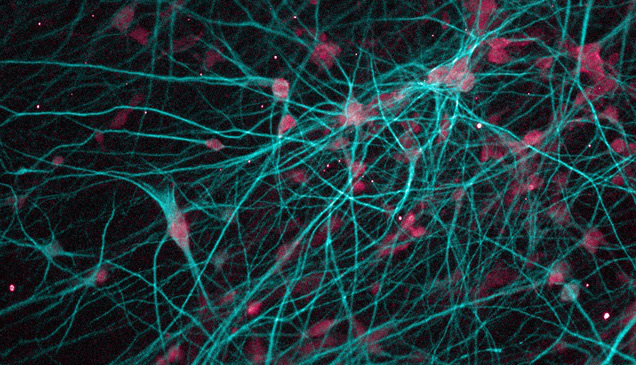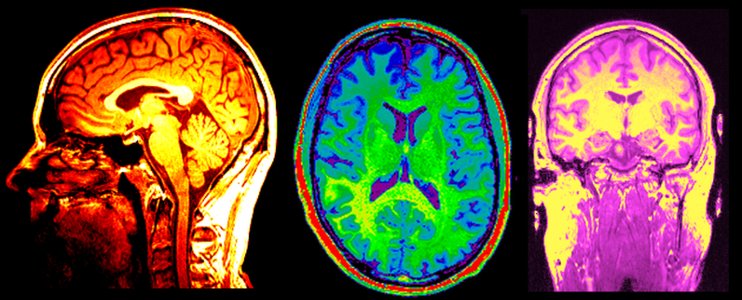Neuroscience is the study of the brain and nervous system in both humans and non-human animals, and in both health and disease.
It is a relatively new field of science, only emerging as a distinct subject in its own right during the 20th century. However, it has grown rapidly and now covers multiple areas including novel technologies, and research into many brain functions and disorders, as well as applications as diverse as education, artificial intelligence and the law.
 Weighing about 1.3 kg, the human brain consists of millions of individual nerve cells or neurons (as shown in the image) plus millions of additional cells known as glia*. These are all connected via microscopic points of contact into a vast network of interlinking circuits and sub-circuits.
Weighing about 1.3 kg, the human brain consists of millions of individual nerve cells or neurons (as shown in the image) plus millions of additional cells known as glia*. These are all connected via microscopic points of contact into a vast network of interlinking circuits and sub-circuits.
The brain is responsible for our thoughts, mood, emotions and intelligence, as well as our physical movement, breathing, heart rate and sleep. In short, it makes us who we are and facilitates almost every aspect of what it means to be alive.
Neuroscientists have the daunting task of trying to understand how all these billions of neurons in the brain and nervous system work.
Although there has been incredible progress, there is still much left to discover.
What happens when we sleep that means it is essential to life? How does chronic pain develop - and how can we stop it doing so? What underlies neurodegenerative diseases such as dementia, motor neuron disease and Parkinson's and how can we treat them? Why do some parts of the brain seem more susceptible to disease than others? How does autism develop? What is the neural basis of consciousness? How can neuroscience help improve treatments for mental health disorders? Can we enhance the brain's ability to learn; and should we?
To have any chance of answering these questions or finding new treatments, it is essential to carry out fundamental basic or 'discovery' neuroscience. Discovery neuroscience research could be characterising an ion channel, studying animal behaviour, tracing nerve pathways or finding out how the eye can detect movement. Establishing the fundamentals of the nervous system through discovery science paves the way for translational research, bringing better technologies, drugs, therapies and understanding of the nervous system.
It's a fascinating field where discoveries have huge impact for individuals and across society. If you're interested in neuroscience, please join us or support us in our work.
Top
Learn more about neuroscience**
Or why not become a neuroscientist yourself? Find out more in careers.
Top
* More information on the number of neurons and glia in the brain can be found in the following reference: 'von Bartheld, C., Bahney, J. and Herculano-Houzel, S. (2016). The search for true numbers of neurons and glial cells in the human brain: A review of 150 years of cell counting. Journal of Comparative Neurology, 524(18), pp.3865-3895'
** Please note that any information provided by the BNA via its website, publications, or its members is for informational purposes only and does not constitute medical advice; it is not intended to be a substitute for professional medical advice, diagnosis, or treatment. Always seek the advice of a physician or other qualified health provider with any questions you may have regarding a medical condition.









 Weighing about 1.3 kg, the human brain consists of millions of individual nerve cells or neurons (as shown in the image) plus millions of additional cells known as glia
Weighing about 1.3 kg, the human brain consists of millions of individual nerve cells or neurons (as shown in the image) plus millions of additional cells known as glia